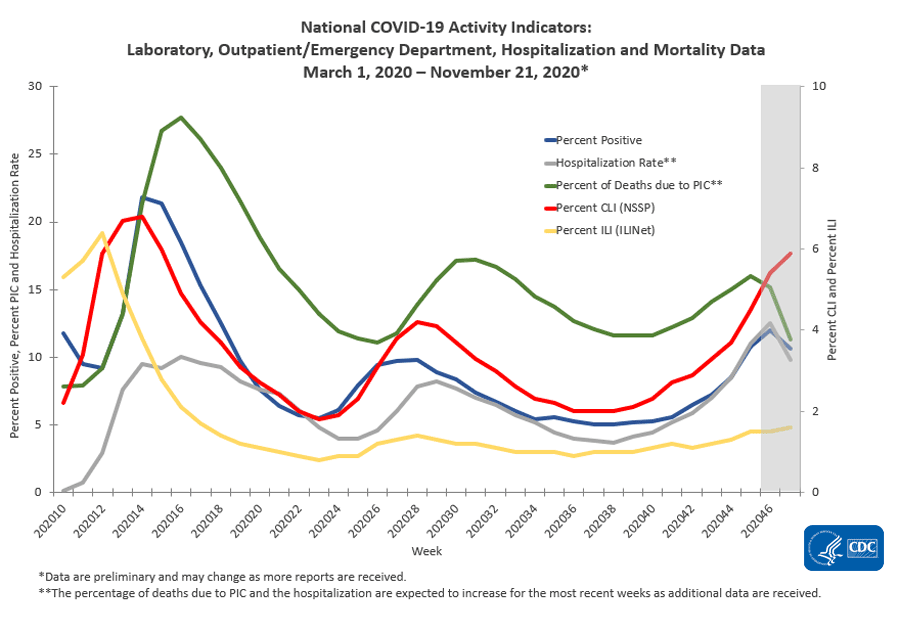术语“非急需手术”一词,常被误解为诸如整容手术之类的无关紧要的手术。实际上,这个词包含了很多需要住院治疗的手术项目,其中不乏切除癌症肿瘤等严重病情。
随着美国新冠病例持续增加,大量医院不得不再次暂停非急需的手术及医疗程序,为新冠患者腾出空间。一些其他专业的医护被调去照顾新冠患者,美国人常规的癌症筛查及心脏检查也将会被推迟。

约翰斯·霍普金斯医院(Johns Hopkins Medicine)指出:“非急需手术并不一定意味着可选性和随意性,只是这些手术可以提前安排罢了。”
该医院指出,在某些情况下,非急需手术也可能用于诸如癌症等严重的病症。此外,还可能包括摘除痣、疣,摘除肾结石等手术。在其他形式的治疗方案不起作用时,非急需手术也可能会被安排上。
目前,美国新冠病例确诊数已超1372万例,造成超过27万人死亡——当然,死亡是一个滞后指标,是一条复杂医疗链的最后一步。从接受检测开始,到确诊、住院治疗,根据病情严重程度一步一步推进。
因此,无论是在加州、俄亥俄州还是纽约,卫生系统都必然做出调整。截至11月29日,加州的病例已经突破120万大关。把视角拉至全美,新冠疫情追踪项目的数据显示,目前全美国有超过93000名美国民众因为感染新冠肺炎而住院——这是自疫情开始以来全国范围内现存病例数的最高点。专家们担心,感恩节前后大量旅客乘坐飞机出门旅行之后,美国疫情在接下来的几天至几周内可能变得更糟。
ICU、医院由此受到了巨大压力。11月30日,纽约州的州长安德鲁·库莫表示,从12月4日开始,水牛城所在的伊利县将不再允许进行非急需手术。
“医院的可容纳病人量是现在国家最关心的问题。”他说。
除纽约州外,加州宣布或将在受灾最严重的地区对非急需医疗程序严加限制。同时,俄亥俄州东北部的Summa Health等大型连锁医院也从12月1日开始暂停非急需手术。
由于假期旅行和新冠肺炎存在潜伏期,住院高峰预计要到1月中旬才会出现。Summa Health亚克朗院区院长大卫·库斯托迪奥博士在接受水牛城当地媒体WGRZ采访时说:“很明显,我们并没有轻率地做出决定。我们清楚它将带来的后果。”
“我希望我们能打包票,在1月2日开始(非急需医疗程序)——但那样是误导民众的做法。我们不知道何时才能开始。得等待疫情轨迹和医院接诊能力来给出答案。”他指出。(财富中文网)
编译:杨二一
术语“非急需手术”一词,常被误解为诸如整容手术之类的无关紧要的手术。实际上,这个词包含了很多需要住院治疗的手术项目,其中不乏切除癌症肿瘤等严重病情。
随着美国新冠病例持续增加,大量医院不得不再次暂停非急需的手术及医疗程序,为新冠患者腾出空间。一些其他专业的医护被调去照顾新冠患者,美国人常规的癌症筛查及心脏检查也将会被推迟。
约翰斯·霍普金斯医院(Johns Hopkins Medicine)指出:“非急需手术并不一定意味着可选性和随意性,只是这些手术可以提前安排罢了。”
该医院指出,在某些情况下,非急需手术也可能用于诸如癌症等严重的病症。此外,还可能包括摘除痣、疣,摘除肾结石等手术。在其他形式的治疗方案不起作用时,非急需手术也可能会被安排上。
目前,美国新冠病例确诊数已超1372万例,造成超过27万人死亡——当然,死亡是一个滞后指标,是一条复杂医疗链的最后一步。从接受检测开始,到确诊、住院治疗,根据病情严重程度一步一步推进。
因此,无论是在加州、俄亥俄州还是纽约,卫生系统都必然做出调整。截至11月29日,加州的病例已经突破120万大关。把视角拉至全美,新冠疫情追踪项目的数据显示,目前全美国有超过93000名美国民众因为感染新冠肺炎而住院——这是自疫情开始以来全国范围内现存病例数的最高点。专家们担心,感恩节前后大量旅客乘坐飞机出门旅行之后,美国疫情在接下来的几天至几周内可能变得更糟。
ICU、医院由此受到了巨大压力。11月30日,纽约州的州长安德鲁·库莫表示,从12月4日开始,水牛城所在的伊利县将不再允许进行非急需手术。
“医院的可容纳病人量是现在国家最关心的问题。”他说。
除纽约州外,加州宣布或将在受灾最严重的地区对非急需医疗程序严加限制。同时,俄亥俄州东北部的Summa Health等大型连锁医院也从12月1日开始暂停非急需手术。
由于假期旅行和新冠肺炎存在潜伏期,住院高峰预计要到1月中旬才会出现。Summa Health亚克朗院区院长大卫·库斯托迪奥博士在接受水牛城当地媒体WGRZ采访时说:“很明显,我们并没有轻率地做出决定。我们清楚它将带来的后果。”
“我希望我们能打包票,在1月2日开始(非急需医疗程序)——但那样是误导民众的做法。我们不知道何时才能开始。得等待疫情轨迹和医院接诊能力来给出答案。”他指出。(财富中文网)
编译:杨二一
The term "elective surgery" is often misunderstood as a procedure like a face-lift or other forms of cosmetic surgery. But in fact, the term covers a wide range of hospitalizations, many of which are serious, such as removing a cancerous tumor.
And as coronavirus cases continue to surge across the U.S., many health systems have yet again had to place a hold on elective surgeries and procedures in order to make room for COVID patients. In some cases, doctors and nurses in certain specialties have been shifted to take care of coronavirus patients while Americans have had to put off routine cancer screenings or heart checkups.
"An elective surgery does not always mean it is optional. It simply means that the surgery can be scheduled in advance," according to Johns Hopkins Medicine.
"But in some cases it may be for a serious condition such as cancer. Examples of elective surgery include removing a mole or wart, and having kidney stones removed. It may also be done if other forms of treatment are not working."
There have now been more than 13.72 million confirmed COVID cases in the U.S. and nearly 270,669 deaths. Of course, deaths are a lagging indicator. They're the final step in a chain of complex medical logistics that begins with receiving a test and then may advance to hospitalization, depending on the severity of the illness.
Health systems from California to Ohio to New York have had to make adjustments given that reality. Cases in the Golden State have soared past 1.2 million as of Nov. 29, a record. Zooming out, nationally, there are currently more than 93,000 Americans hospitalized with COVID-19, according to the COVID Tracking Project. That's an all-time countrywide high since the pandemic began. And experts fear that a flurry of travelers flying during and after the Thanksgiving holiday will only make matters worse in the coming days and weeks.
The effects have put an enormous strain on ICUs and hospitals. New York Gov. Andrew Cuomo said on November 30 that there would be no elective surgeries in Erie County, which houses Buffalo, beginning on Dec. 4.
"Hospital capacity is now the state's top concern," he said.
California may also clamp down on elective procedures in the hardest hit regions. Meanwhile, major hospital chains across Northeastern Ohio, such as Summa Health System, will pause elective surgeries beginning on December 1.
Peak hospitalizations may not occur until mid-January given holiday travel and the coronavirus's incubation period. “Obviously, to make this decision, we didn’t do it lightly, and we understand the repercussions of that," Summa Health System Akron Campus president Dr. David Custodio told local Buffalo affiliate WGRZ.
“I wish we could say exactly we can start [elective procedures] on Jan. 2, but that would be misleading. We don’t know, and that really depends on the trajectory and the capacity,” he continued.






